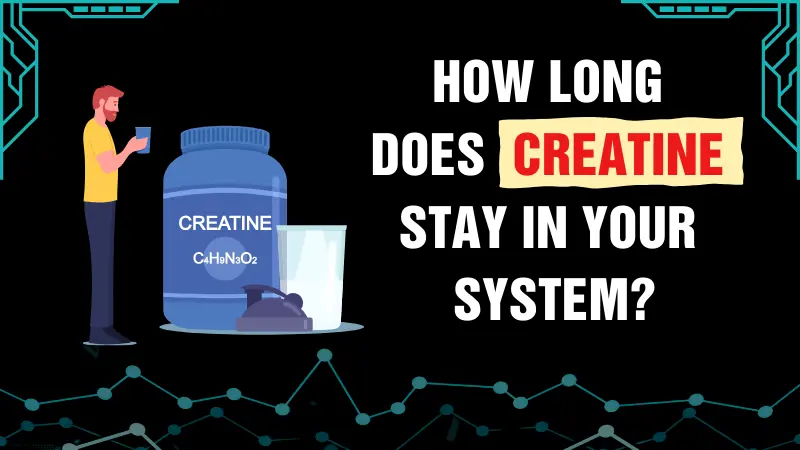
How Long Does Creatine Stay In Your System?
Understanding the Prolonged Presence of Creatine in Your Physiology Creatine, a dietary adjunct employed to improve physical prowess and augment musculature, particularly the skeletal variety, lingers within your biological system for a noteworthy duration.
An array of creatine variants exists, encompassing the renowned creatine monohydrate, alongside creatine Hydrochloride (HCL), Creatine hydroxymethylbutyrate (HMB), and the proprietary formulation known as Kre-Alkalyn. Amongst these, creatine monohydrate emerges as the most economical and meticulously studied choice. Creatine is distributed either as an unadorned powder or encased within capsules, with a predilection for neutrality in flavor.
Upon its ingress into your corporeal confines, creatine embarks on a journey orchestrated by specialized carriers through the cytosolic expanse. It confers vitality to a multitude of bodily processes by virtue of adenosine triphosphate (ATP), a pivotal compound.
Subsequently, creatine undergoes filtration by the renal apparatus, resulting in two distinct fates: it may be sequestered within the reservoirs of musculature, morphing into phosphocreatine, or it may take its leave as creatinine, excreted via urination.
While ensconced within muscle tissue, creatine exerts an osmotic pull, ushering fluids into the interior of muscular cells, thereby contributing to the perceptible enlargement of these anatomical structures.
Factors Affecting Creatine Duration
Several factors can have a bearing on how long does creatine stay in your system:
Age
Age might exert influence over the duration creatine lingers within your physiological framework, although additional investigation remains requisite. Robust grown-ups should encounter no impediments when considering creatine supplementation, and whilst the exploration pertaining to creatine has not revealed any protracted deleterious ramifications, adolescents ought to exercise prudence when contemplating this adjunct.
It is essential to reiterate that creatine represents a non-obligatory adjunct; ergo, it is not incumbent upon you to partake in supplementation unless it aligns with your intentions.
Dosage
The initiation of creatine regimens ushers in the loading phase, a phase that commences with a robust dose, thus optimizing the swift saturation of creatine reserves. This initial phase extends over a span of 5 to 7 days. As the reservoirs of muscle-bound creatine reach a state of satiety, the transition to the maintenance phase becomes inevitable. During this phase, a moderated daily dosage becomes the cornerstone of preserving the desired levels of saturation.
The quantity of creatine consumed by an individual is subject to variation; nonetheless, during the loading phase, a conventional dose hovers around 0.3 grams per kilogram of body weight daily, fragmented into four equitably apportioned administrations throughout the day. For most individuals, this amounts to approximately 20 to 25 grams of creatine each day.
As one traverses into the maintenance phase, the recommended dosage range stands at 3 to 5 grams daily. In this phase, the strategic consumption of creatine before and/or after workouts becomes a viable approach.
BMI
A Complex Metric for Health Assessment Body Mass Index (BMI) stands as a numerical computation that employs an individual’s height and body mass to categorize them into distinct groups: underweight, within a “healthy” weight spectrum, overweight, or obese. While BMI can offer insights into one’s health status, it remains an imperfect gauge, far from the ultimate arbiter of well-being. Its application should not factor into decisions regarding creatine supplementation, as creatine is a viable choice for individuals of diverse body compositions, shapes, and sizes.
In essence, BMI serves as a multifaceted metric that endeavors to assess an individual’s physique in relation to their weight and stature. This intricate calculation amalgamates anthropometric data to ascertain an individual’s approximate body fat content. Nevertheless, it’s pivotal to recognize the limitations of this metric and refrain from overreliance on it when contemplating dietary or fitness choices.

Individual Variation
It’s crucial to recognize that everyone’s metabolism is unique. Consequently, the duration of creatine in your system can vary from person to person.





